De Amerikaanse schrijver en essayist Edmund White werd geboren op 13 januari 1940 in Cincinnati. Zie ook alle tags voor Edmund White op dit blog.
Uit: Hotel de Dream
“This little room above the massive front oak door was his study, where now he was wheezing, listless and half-asleep, on the daybed. The whole room smelled of dogs and mud. At one end, under the couch and Stephen’s table, there lay a threadbare Persian carpet, pale and silky but discolored on one side with a large tea-stain the shape of Borneo.At the other end of the room it had amused Stephen to throw rushes on the floor as if he were a merry old soul living in crude, medieval splendor. There were reeds and rushes and grass everywhere downstairs, which confused two of the three dogs, Tolstoi and Spongie, into thinking they were outdoors: they weren’t always mindful of their best housebroken comportment.
The maid, a superstitious old thing, had placed a small jar of tar under Stephen’s bed. Did she think it would absorb the evil spirits, or hold off the ghosts that were supposed to haunt Brede Place?
Yes, Stephen had all the symptoms, what the doctors called the “diathesis,” or look of consumption: nearly transparent skin, through which blue veins could be seen ticking, and a haggard face and a cavernous, wheezing chest. His hair was as lank and breakable as old lamp fringe. His voice was hoarse from so much coughing and sometimes he sounded as if he were an owl hooting in the innermost chamber of a deep cave. He complained of a buzzing in the ears and even temporary deafness, which terrified a “socialist” like him, the friendliest man on earth (it was Cora’s companion, the blameless but dim Mrs. Ruedy, who had worked up this very special, facetious, meaning of socialist). Cora wondered idly if Mrs. Ruedy was back in America yet—another rat deserting the sinking ship.
Cora glimpsed something bright yellow and pushed back Stephen’s shirt—oh! the doctor had painted the right side of his torso with iodine. At least they weren’t blistering him. She remembered how one of the “girls” in her house, the Hotel de Dream, in Jacksonville, had had those hot jars applied to her back and bust in order to raise painful blisters, all to no avail. She’d already been a goner.
“Hey, Imogene,” Stephen murmured, his pink-lidded eyes fluttering open. He smiled, a faint echo of his usual playfulness. He liked to call her “Imogene Carter,” the nom de plume she’d made up for herself when she was a war correspondent in Greece and which she still used for the gossip columns and fashion notes she sent to American newspapers.”
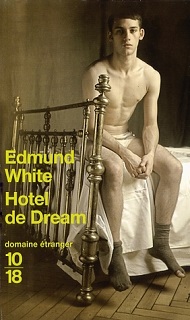
Edmund White (Cincinnati, 13 januari 1940)
Cover
De Duitse schrijver Daniel Kehlmann werd op 13 januari 1975 in München geboren. Zie ook alle tags voor Daniel Kehlmann op dit blog.
Uit:Tyll
„Der Krieg war bisher nicht zu uns gekommen. Wir lebten in Furcht und Hoffnung und versuchten, Gottes Zorn nicht auf unsere fest von Mauern umschlossene Stadt zu ziehen, mit ihren hundertfünf Häusern und der Kirche und dem Friedhof, wo unsere Vorfahren auf den Tag der Auferstehung warteten.
Wir beteten viel, um den Krieg fernzuhalten. Zum Allmächtigen beteten wir und zur gütigen Jungfrau, wir beteten zur Herrin des Waldes und zu den kleinen Leuten der Mitternacht, zum heiligen Gerwin, zu Petrus dem Torwächter, zum Evangelisten Johannes, und sicherheitshalber betetenwir auch zur Alten Mela, die in den rauen Nächten, wenn die Dämonen frei wandeln dürfen, vor ihrem Gefolge her durch die Himmel streift. Wir beteten zu den Gehörnten der alten Tage und zum Bischof Martin, der seinen Mantel mit dem Bettler geteilt hatte, als es diesen fror, sodass sie danach beide froren und beide gottgefällig waren, denn was nützt ein halber Mantel im Winter, und natürlich beteten wir zum heiligen Moritz, der mit einer ganzen Legion den Tod gewählt hatte, um nicht seinen Glauben an den einen und gerechten Gott zu verraten.
Zweimal im Jahr kam der Steuereintreiber und schien immer überrascht, dass wir noch da waren. Hin und wieder kamen Händler, aber da wir nicht viel kauften, zogen sie schnell ihrer Wege, und so war es uns recht. Wir brauchten nichts aus der weiten Welt und dachten nicht an sie, bis eines Morgens ein Planwagen, gezogen von einem Esel, über unsere Hauptstraße rollte. Es war ein Samstag und seit kurzem auch Frühling, der Bach schwoll vom Schmelzwasser an, und auf den Feldern, die gerade nicht brachlagen, hatten wir die Saat ausgebracht.“

Daniel Kehlmann (München, 13 januari 1975)
De Amerikaanse schrijver Jay McInerney werd geboren op 13 januari 1955 in Hartford, Connecticut. Zie ook alle tags voor Jay McInerney op dit blog.
Uit: The Last Bachelor (Sleeping with Pigs)
“Wait a minute,” my shrink says. “Stop. Go back. Did you say in the bed?” I nod cautiously. Actually, my mind was drifting off on a tangent. Even as I was droning on about my failed marriage, I was wondering, not for the first time, why she had a picture of John Lennon in her office and whether it was an Annie Liebowitz. You know, the one where he’s in a sleeveless New York City T-shirt with his arms crossed. “The pig was sleeping in the bed. With you. In the marital bed. With you and your wife.” “Well, yes,” I say. “You’ve been coming to me for more than a year, trying to come to terms with your guilt about the breakup of your marriage, and this is the first time it’s occurred to you to mention that the pig was sleeping with you in the bed?” I can see her point. I don’t know why I didn’t mention it before. It was actually a big point of contention at the time. On the other hand, I was behaving so badly by then that I didn’t really feel I was in a position to make demands. Blythe used to have all kinds of jokes about sleeping with two pigs. No, actually, it was the same joke over and over. Plus, McSweeney’s my surname and she liked to call me McSwine. “Was this a nightly occurrence? How long did it go on?” “Pretty much every night for a year or so. Two years maybe. Mostly at the end.” “And where did the pig sleep?” “Between us.” “Between you. In the bed.” Apparently, she wants to make sure she’s clear on this point. “Sometimes it would burrow under the covers and sleep down at the foot.” “Didn’t you think this was relevant to our enterprise here? To the whole question of the fate of the marriage? That you were being asked to sleep with a pig between you? Am I safe in assuming this wasn’t your idea?” “Of course not.” About this at least, I can be emphatic. “It was hers.” “And you didn’t object?” “Well, yeah, sometimes. In the beginning.”
“And then?” “Well, you get used to things.” She sighs and shakes her head. “I think we need to talk about this.” I can see her point. In retrospect, here, on the Upper West Side of New York, sitting in this book-lined office across from my shrink, who is literally and figuratively framed within a constellation of diplomas and portraits of Carl Jung, Hannah Arendt and Anna Freud, I can imagine how bizarre this sounds. Now that it’s come up, I’m kind of amazed myself that I let my ex-wife talk me into sharing the bed with her potbellied pig. Over time almost anything can come to seem normal in the course of a marriage: food fetishes, sexual kinks, even in-laws. First you get talked into a pet pig, and the next thing you know it’s sleeping with you. “How did it get up on the bed?” “She built a ramp. With carpeted steps.” “And you didn’t think this was … unusual? And, in terms of your marriage, unhealthy? How did you manage to have sexual relations with a— How big was the pig?” “By then? Hard to say, really. Too big to lift anyway. I threw my back out the last time I tried. Hundred and sixty, hundred and seventy pounds. About my weight. Plus, the shape’s kind of awkward and it’s not like they’re going to hold still and stay quiet when you try to pick them up.”
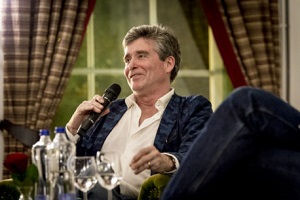
Jay McInerney (Hartford, 13 januari 1955)
De Amerikaanse schrijfster Lorrie Moore werd geboren op 13 januari 1957 in Glens Falls, New York. Zie ook alle tags voor Lorrie Moore op dit blog.
Uit: Self-Help
« Meet in expensive beige raincoats, on a pea-soupy night. Like a detective movie. First, stand in front of Florsheim’s Fifty-seventh Street window, press your face close to the glass, watch the fake velvet Hummels inside revolving around the wing tips; some white shoes, like your father wears, are propped up with garlands on a small mound of chemical snow. All the stores have closed. You can see your breath on the glass. Draw a peace sign. You are waiting for a bus.He emerges from nowhere, looks like Robert Culp, the fog rolling, then parting, then sort of closing up again behind him. He asks you for a light and you jump a bit, startled, but you give him your “Lucky’s Lounge–Where Leisure Is a Suit” matches. He has a nice chuckle, nice fingernails. He lights the cigarette, cupping his hands around the end, and drags deeply, like a starving man. He smiles as he exhales, returns you the matches, looks at your face, says: “Thanks.”He then stands not far from you, waiting. Perhaps for the same bus. The two of you glance furtively at each other, shifting feet. Pretend to contemplate the chemical snow. You are two spies glancing quickly at watches, necks disappearing in the hunch of your shoulders, collars upturned and slowly razoring the cab and store-lit fog like sharkfins. You begin to circle, gauging each other in primordial sniffs, eyeing, sidling, keen as Basil Rathbone.A bus arrives. It is crowded, everyone looking laughlessly into one another’s underarms. A blonde woman in barrettes steps off, holding her shoes in one hand.You climb on together, grab adjacent chrome posts, and when the bus hisses and rumbles forward, you take out a book. A minute goes by and he asks what you’re reading. It is Madame Bovary in a Doris Day biography jacket. Try to explain about binding warpage. He smiles, interested.Return to your book. Emma is opening her window, thinking of Rouen.”What weather,” you hear him sigh, faintly British or uppercrust Delaware.Glance up. Say: “It is fit for neither beast nor vegetable.”It sounds dumb. It makes no sense.But it is how you meet.At the movies he is tender, caressing your hand beneath the seat.At concerts he is sweet and attentive, buying cocktails, locating the ladies’ lounge when you can’t find it.At museums he is wise and loving, leading you slowly through the Etruscan cinerary urns with affectionate gestures and an art history minor from Columbia. He is kind; he laughs at your jokes.After four movies, three concerts, and two-and-a-half museums, you sleep with him. It seems the right number of cultural events. On the stereo you play your favorite harp and oboe music. He tells you his wife’s name. It is Patricia.”
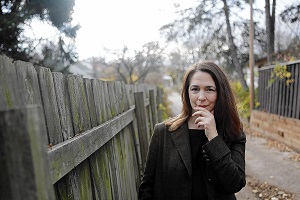
Lorrie Moore (Glens Falls, 13 januari 1957)
De Nederlandse historicus en dichter Jan de Bas werd geboren op 13 januari 1964 in Waddinxveen. Zie ook alle tags voor Jan de Bas op dit blog.
De tweede Noach
Ik reed rond op mijn gemak,
in mijn gele regenpak,
onder zon en wolken droog,
’t leek wel of de hemel loog.
Mensen lachten achter mij,
maar niet meer van angsten vrij,
zagen ze de regenboog,
ook al was de hemel droog.
Plots, viel recht de regen neer,
niemand voor me lachte meer,
toen de hemel openbrak,
op mijn gele regenpak.
Zo is het leven
Prediker 3: 21
Hond. Vier poten in de mand.
Kijken. Blaffen. Hijgen. Vier
poten uit de mand. Lopen.
Stilstaan. Lopen naar de mand.
Hond. Vier poten in de mand.
Kijken. Blaffen. Hijgen. Vier poten
uit de mand. Lopen. Blaffen.
Hijgen. Hond. Vier poten
in de mand. Kijken. Blaffen.
Hijgen. Zitten. Blaffen. Hijgen.
Liggen. Blaffen. Hijgen. Hond.
Vier poten in de mand.

Jan de Bas (Waddinxveen, 13 januari 1964)
De Argentijnse schrijver en regisseur Edgardo Cozarinsky werd geboren 13 januari 1939 in Buenos Aires. Zie ook alle tags voor Edgardo Cozarinsky op dit blog.
Uit: Die Braut aus Odessa: Erzählungen (Vertaald door Sabine Giersberg)
„Auf dem rosa Granit der Potemkin-Treppe ein paar Meter weiter unten entdeckte er ein Mädchen, das gedankenverloren in die Landschaft starrte, ihr Blick war nicht weniger traurig als seiner. Sie hatte sich auf eine Stufe gesetzt und zwei große runde Schachteln übereinander neben sich abgestellt, um jede war ein blaues Atlasband gebunden, sie wurden von einer einfachen Klemme zusammengehalten, und auf dem Schild konnte man in lateinischen Buchstaben lesen: »Madame Yvonne. Paris – Wien – Odessa«.
Eine Brise erfrischte die Luft und schob in der Ferne über dem Meer launische Wolkengebilde von Osten nach Westen, Drachen und Erzengel, die eine glückliche Begegnung vorauszusagen schienen. Der junge Mann, wir wollen ihn Daniel Aisenson nennen, wusste nicht, mit welchen Worten man eine Fremde ansprach. Er ging zu dem Mädchen hin, stellte sich neben sie und lächelte. Als es ihr unangenehm wurde, so zu tun, als würde sie ihn nicht bemerken, warf sie ihm einen strengen Blick zu, der sofort sanft wurde. Etwas an ihm bezeugte seine Unschuld, etwas, das den unflätigen oder schmeichlerischen Verführern abging, die sie in der großen Stadt sofort zu erkennen gelernt hatte.
Wir werden nie erfahren, welches die ersten Worte waren, die sie austauschten, und auch nicht, wer sie sprach, aber es ist nicht abwegig, dass sie die Schüchternheit des Jungen besiegten. Daniel war in einem Schtetl geboren; als er fünf Jahre war, zogen seine Eltern in einen Randbezirk der Stadt, die heilige unter den heiligen, Kiew, von der er wenig mehr kannte als den Besarabia genannten Markt und das Posamentengeschäft der Familie. Mehr als einmal hatte er als Jugendlicher das Gold und die Voluten der Sophien-Kirche, die fünf leuchtenden Kuppeln der Andreas-Kirche und den noch höheren Glockenturm des Percherska-Klosters bestaunt.
Er konnte nicht verhindern, dass er diesen Glanz mit der bescheidenen Synagoge verglich, die seine Eltern ohne große Hingabe besuchten und in die er sie begleiten musste. Und dieser Vergleich machte, dass er sich schuldig fühlte.“
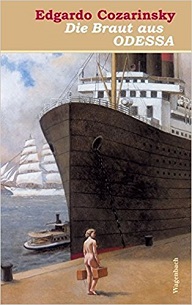
Edgardo Cozarinsky (Buenos Aires, 13 januari 1939)
Cover
De Iraanse schrijver Mohammad-Ali Jamālzādeh Esfahani werd geboren op 13 januari 1892 in Isfahan. Zie ook alle tags voor Mohammad-Ali Jamālzādeh op dit blog.
Uit: Persian Is Sugar (Vertaald door Heshmat Moayyad en Paul Sprachman)
“I was entertaining the thought of going ahead and proferring a bonjour monsieur, just to let him know that I, too, belonged, when a hissing sound from the other end of the cell attracted my attention. Looking in that direction, I could make out something shiny and white that resembled a cat curled over a bag of coals. In reality, however, I was looking at a Mullah who sat in the manner of school children, with his arms wrapped around his knees. His entire body was covered by his cloak. What I had mistaken for a shiny, white cat was his turban the tail end of which, dangling over his shoulder, looked like the tail of a cat. The hissing sound, of course, was the sound of his Arabic prayers.
It was now apparent that three guests shared the same cell. Considering number three as a good omen, I was about to inquire from my friends who they were and what circumstance had landed them in this cell; I even entertained the possibility of our collectively discovering a way out of our predicament, when the cell door flung wide open, and amid the commotion, a poor young boy, wearing a felt cap, was thrown into the cell. Then as quickly as the boy was thrown in, the door was shut again. It turned out that the same newly-appointed official from Rasht, had thrown this innocent, poor child into this cell to intimidate the population. Some time earlier, during the altercations of the Constitutional Revolution, it turned out, this little boy had been employed by a Cossack as a servant.
Recognizing that crying was absolutely useless, the new comer dried his eyes using the tail of his dirty shirt. At the same time, knowing that there were no guards around, he directed a volley of special Iranian curses toward almost everyone who came to his mind, all the time kicking the door and the walls of the cell with his bare feet. Once he realized that the door, flimsy as it looked, was not about to fall apart, he spat on the floor, looked around, and found out that there were other people present in the cell..
He considered me to be a European and, therefore, of no help to him. The Europeanized fellow, too, did not seem to inspire much confidence in him. Walking gingerly, he approached the Mullah. Then, after staring a while at him, in a trembling voice, said, “Excellency, in the name of the holiest of the holies, what have I done to deserve this? Wouldn’t it be appropriate for us all to commit suicide and free ourselves from this oppression?”
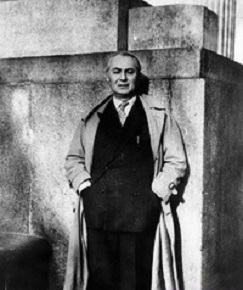
Mohammad- Ali Jamālzādeh (13 januari 1892 – 8 november 1997)
De Amerikaanse dichter, schrijver en beeldhouwer Clark Ashton Smith werd geboren in Long Valley (Californië) op 13 januari 1893. Zie ook alle tags voor Clark Ashton Smith op dit blog.
Fire Of Snow
Pale fire of snow had lit the dusk for me:
Astray with mind half-consciously intent
I had not thought the wood so imminent—
Pregnant with pine and sombre cypress-tree.
Darker than sleep, and mute with mystery
Like far-off death, where questing dreams are spent,
Their winding caverns deepened as I went
Therein, and paused in old expectancy.
Pale fire of snow had lit the dusk for me….
But the black stillness held where once the wind
Had parted boughs in music, that the gleam
Of stars might enter; all was strangely blind,
Like midnight thickening ‘neath the middle sea—
Filled with the silence of a time-slain dream.
February
Gossamer-frail, the moon
Goes down the skies of days;
Vague winds are on the noon,
Blown from the wandering vales
of cloudland far away.
They come, and hardly stir
The dell-grown grasses high;
But in the pine and fir,
As in my musing heart,
I hear a tender sigh.
Fragile as dreams, afloat
Between the earth and skies,
Beyond serene, remote,
Blue-folded hills the fair
And moon-white mountains rise.
In woodland shadows deep
The firstling flowers blow;
And in my heart I keep
A love that also came
After the frost and snow.
Foggy Night
Hastening I strode
Past the drunkard lying
Beside the moonless road.
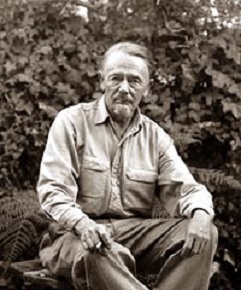
Clark Ashton Smith (13 januari 1893 – 14 augustus 1961)
Onafhankelijk van geboortedata
De Amerikaanse schrijver Michael Carroll werd geboren in 1965 en groeide op in een wijk van Fort Caroline (nu Jacksonville), Florida. Zie ook alle tags voor Michael Carroll op dit blog.
Uit: Little Reef and Other Stories (Little Reef)
“He was a tad older than Wes, gainfully employed, something of a father figure, and very sensible with money—in short, a male role model. Shouldn’t be any harder than hooking a bride, and yet meeting your grandson habitually in bars on Friday nights hardened you not just about gays. Her only husband, all that time ago—well, people were people. She liked the salt crystals around the cool sweaty rim of the curvaceous glass. The first few sips, like breaths drawn in the cool depths of a cavernous rainforest. She wanted to go to Brazil someday alone, ensconced in a tour group. The electric-blue and uncannily gilt fish flicked bigly with their self-possessed dignity off to one side of the tank, hovering unblinking. Buster’s hemorrhoids were killing him. He’d done a sugar reading just before and it topped off at 80, a triumph. Everything was medical. Get after the age of thirty in life and it was just numbers, stats you filed with medical authorities. He lived alone. Buster wanted a lover, but not as much as he needed tips. To live, he served. He turned and wiped the counter, and Alison straightened up from her slump. His slump. Alison was becoming Alex and so now Alex said, “Shit, I forgot to bring my STP.” Stand To Pee: a plastic funnel and little hose gadget Buster hoped he’d soon not have to hear about again. He hummed, saying, “I’ll watch your drink. You want to run home and get it?” He’d been sipping beer and went to the register to make Mrs. Blake’s change, thinking of Wes. Have Wesley Blake and he’d be calm like sipping watery Jack, intoxicated. But he’d never have Wesley, not with Mrs. Blake as gatekeeper. Life got you in its tickling reaches and laughed. Alison/Alex slumped again and Buster felt a certain love for her, wild beaten-down thing. “No:’ Alison/Alex said, touch of the drama queen, “I’m fine,” tittering to herself. “Fine:’ Kid was a quiz, messed up some at home then shoved out the door to hang out in bars. Buster came around with three and a half dollars’ change, thinking, nice lady, you do not know. How I’m on the edge, how we’re all on the edge, and I need affection as much as you do. »
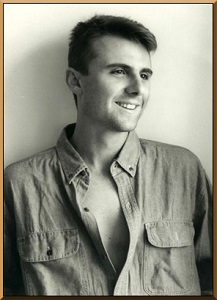
Michael Carroll (Fort Caroline, 1965)
Zie voor nog meer schrijvers van de 13e januari ook mijn vorige blog van vandaag.
Zie voor bovenstaande schrijvers ook mijn blog van 13 januari 2007 en ook mijn blog van 13 januari 2008 en eveneens mijn blog van 13 januari 2009.
